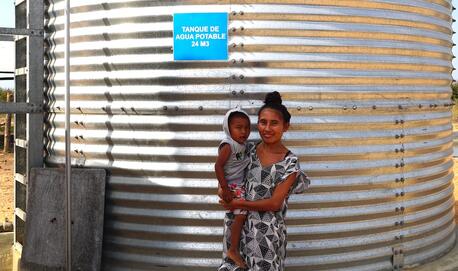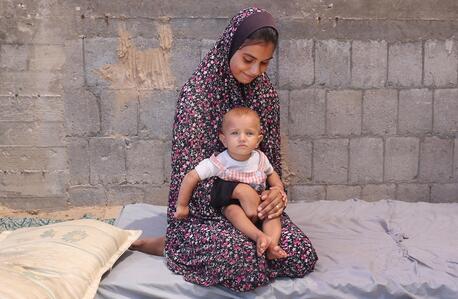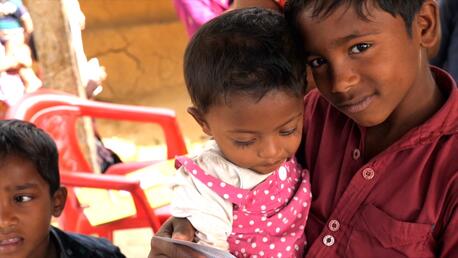
Advancing Sustainable, Climate-Resilient Water Systems in Colombia
A transformative and lifesaving project launched in 2021 by UNICEF USA, UNICEF Colombia and the Baxter International Foundation has been expanded for three additional years through 2027. The partnership will improve access to climate-resilient water, sanitation and hygiene (WASH) services for families in rural Colombia.
Estefany starts each day by brushing her teeth alongside her two children, 5-month-old Matías and 2-year-old Jeisson. Then she heads out to check the solar panels on her community’s water system, preparing for her day’s work — turning salt water into fresh water.
A member of the Wayúu, the largest indigenous group in northern Colombia, Estefany lives in the Guarerapo community in the country’s La Guajira department. With an arid desert climate and an economy that relies on destabilizing mineral resource extraction, fresh water is scarce in La Guajira. Natural disasters and weather emergencies compound the lack of safe drinking water.
Unsafe water, sanitation and hygiene (WASH) environments jeopardize children’s health and human rights in Colombia and around the world. In 2023 alone, 136 children in La Guajira died due to preventable diseases related to poor WASH conditions, according to Colombia’s National Institute of Health. Globally, over 1,000 children under 5 die every day from diseases linked to inadequate WASH services, which kill 1.4 million people every year.
UNICEF USA, UNICEF Colombia and the Baxter International Foundation recognize the urgent need for resilient and adaptive solutions, and have partnered since 2021 on programming to improve access to safe WASH services for thousands of children, adolescents, families and communities in Colombia. The Baxter International Foundation recently extended its support through 2027 to reach thousands more children and families in the region. The additional funding will help UNICEF rehabilitate water systems, promote basic sanitation using community-based solutions, monitor water quality and distribute hygiene kits and other supplies to Colombia’s most vulnerable children.
Solar-powered water plants improve the lives of women and girls
Estefany, 23, is the plumber for her local solar-powered water plant, which serves more than 2,500 people in her community, including over 600 students from the Isidro Ibarra Education Institution. The system converts contaminated, untreated groundwater into clean water that can be stored and used for multiple purposes. “Here, we all drink water from the plant because it comes out fresh. We use it for everything. We cook with it. We wash ourselves and our clothes,” Estefany explains.
Before the water treatment plant’s installation, members of Estefany’s community collected rainwater from contaminated sources like lakes and streams, sharing these unsanitary resources with livestock. “That is not life,” she says. “Salt water is not drinkable. Maybe for animals, but not for people.”
Where no local water system exists, women and girls must collect water from untreated reservoirs, traversing rough terrain and risking gender-based violence. Many girls miss out on a comprehensive, quality education because of this arduous daily task, limiting their chances at employment and economic opportunity.
Expanding WASH services to build a healthier future for all
With UNICEF training, Estefany and the other members of her local water committee learned how to operate and maintain their new water system. Mastering these valuable technical skills and knowing that she can help her community build longterm resiliency inspired Estefany to continue her education, “so that I can work and so that my children have a better future.”
The expanded program aims to enhance access to quality, climate-resilient WASH services to directly benefit 12,000 children and families, and their broader communities, in Colombia’s La Guajira and Chocó departments. Estefany describes how the water plant has changed her community. “When we did not have this system here, we used to buy water by tank truck, which cost between 320,000 and 350,000 pesos ($80 – 90) for 1,320 gallons of water. Imagine those in the community that don’t have the means to pay 320,000 pesos. It is important to maintain the system longterm to continue enjoying the clean water we have here.”
Safe, sustainable WASH services safeguard children’s health, well-being and education. Supported by UNICEF social behavior change training, more than 2,100 people, including over 850 children and adolescents, no longer practice open defecation. Self-built latrines and water points in homes and schools have led to more dignified environments and better public health outcomes.
Modifying behaviors and norms is essential to maintaining improved sanitation practices once UNICEF and its partners have completed their work. The extended partnership will support 70 communities — 45 in La Guajira and 25 in Chocó — in eliminating fecal contamination and open defecation. Thirty of these communities will also receive support to improve hygiene practices and increase access to climate-resilient WASH services in six schools.
One project, many interlocking goals
Adopted by United Nations Member States in 2015, the 2030 Agenda for Sustainable Development, set forth 17 interconnected UN Sustainable Development Goals (SDGs), illustrating how the global community can work together to tackle poverty, improve lives and protect the environment. Every SDG affects children’s ability to reach their full potential.
The collaboration between UNICEF and the Baxter International Foundation demonstrates how one partnership can address multiple targets. In implementing new WASH infrastructure and sustainable, climate-resilient systems that are managed by community members, the project touches on SDGs pertaining to WASH, infrastructure, climate action, gender equality, and sustainable cities and communities.
For her own children, Estefany hopes that “They have a way to study and that the water system is not temporary, but permanent because we all benefit from it, children and adults.”
Learn more about the impact of UNICEF's partnership with the Baxter International Foundation.
HOW TO HELP
There are many ways to make a difference
War, famine, poverty, natural disasters — threats to the world's children keep coming. But UNICEF won't stop working to keep children healthy and safe.
UNICEF works in over 190 countries and territories — more places than any other children's organization. UNICEF has the world's largest humanitarian warehouse and, when disaster strikes, can get supplies almost anywhere within 72 hours. Constantly innovating, always advocating for a better world for children, UNICEF works to ensure that every child can grow up healthy, educated, protected and respected.
Would you like to help give all children the opportunity to reach their full potential? There are many ways to get involved.





